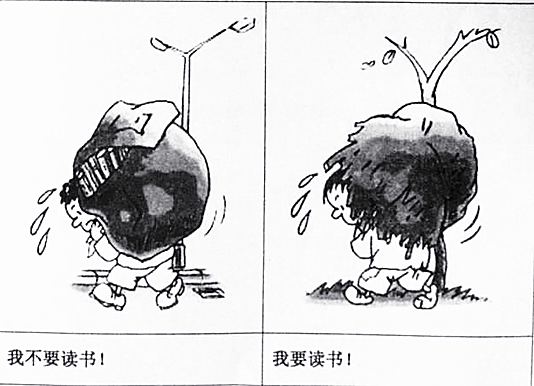题目内容
5.下面两幅图反映的是部分城乡孩子所面临的窘境.请就此图谈谈你的想法,你的文章应包括:具体描述两幅图;
简要分析造成这两种现象的原因;
提出解决问题的建议.
(注:请勿出现真实姓名和学校)

分析 高分句型一:
What he wishes is that he didn't go to school any more.他希望再不去学校上学.
高分句型二:
What they face is the endless homework,which puts so much pressure on them that some students don't want to continue their studies.他们所面对的是无尽的作业,那些给他们带去了很大的压力以至于有些学生不想再继续他们的学业.
句型一 ①What he wishes 该句是一个由what引导的主语从句,what在从句中充当宾语
②that he didn't go to school any more 该句是一个由that引导的表语从句,that在句中只作引导词,不作句中成分
句型二 ①What they face is the endless homework 该句是一个由what引导的主语从句,what在从句中充当宾语
②which puts so much pressure on them…该句是一个由which引导的非限制性定语从句,which在从句中作主语,替代先行词pressure
解答 The two pictures show some problems in the present education system in China.A student is on his way home from school,a heavy bad of books on his back.What he wishes is that he didn't go to school any more.(高分句型一)In the second picture,a peasant boy,carrying a heavy bundle of rice straw,is out of breath under the great pressure.He hopes to attend school.
The children in cities can enjoy bright classroom and adequate facilities.What they face is the endless homework,which puts so much pressure on them that some students don't want to continue their studies.(高分句型二)However,in the countryside,especiall in some western parts,some children are forced to drop out because their parents cann't afford the tution.(分析原因)
As far as I am concerned,the students in the city should cherish the chance,trying their best to study.what's more,the government should take measures to ganrantee the study of the students in the countryside.In that way,all the children can receive equal education.(提出办法)
点评 本文是图画类写作,考生在写作前应仔细观察所给图画,再运用准确的、合适的语言结合实际将图片内容描述清楚.写作过程中切忌偏离主题,尽量做到图文搭配.

| A. | opinion | B. | habit | C. | idea | D. | manner |
-Thank you,_____.( )
| A. | if you wish | B. | it just depends | ||
| C. | It's up to you | D. | It couldn't be better |
| A. | sight | B. | scene | C. | view | D. | look |
However,lately more and more Chinese people are turning to a different (1)B.Coffee has become a/an (2)D popular choice of Chinese people living abroad and in the country's (3)A cities.In big cities such as Beijing,coffee shops seem to be on nearly every major street corner.These (4)C are not just selling drinks from Starbucks,the world-famous coffee company.Coffee businesses from South Korea and Britain are also (5)C in China.
Many young Chinese people drink coffee (6)D--when meeting with friends.Yang Lin lives in the U.S.but comes from an area in China (7)A for growing tea.She used to (8)B drink tea while in China.But now,she says,she drinks both and for different reasons.
Yang Lin says she was a tea drinker when she was back in China.But she likes coffee and tea (9)Cnow.Drinking coffee for her is a social event.She and her co-workers like to sit in a café and talk over a cup of coffee.Tea,she says,is more about family (10)A.She grew up in Fujian province--an area known for its tea.Ms.Yang says that as a child,her family would (11)B together in the evening and talk about the day's events over a steaming pot of tea.So now,(12)A the smell of Fujian tea brings back these (13)D family memories.
On average a person in China drinks about five cups of coffee a year.This information comes from the China Coffee Association Beijing.That (14)C is far below the world average of 240cups a year.But the association says the amount of coffee that Chinese drink is (15)B by about 15percent every year.
| 1.A.business | B.drink | C.attitude | D.custom |
| 2.A.abnormally | B.necessarily | C.thoroughly | D.increasingly |
| 3.A.huge | B.ancient | C.remote | D.conservative |
| 4.A.cities | B.companies | C.shops | D.foreigners |
| 5.A.producing | B.earning | C.operating | D.struggling |
| 6.A.passively | B.deliberately | C.elegantly | D.socially |
| 7.A.famous | B.appropriate | C.anxious | D.beneficial |
| 8.A.seldom | B.only | C.unwillingly | D.never |
| 9.A.completely | B.gradually | C.equally | D.eventually |
| 10.A.memories | B.values | C.possessions | D.traditions |
| 11.A.work | B.gather | C.cook | D.pull |
| 12.A.even | B.still | C.somehow | D.hardly |
| 13.A.rare | B.tough | C.lonely | D.warm |
| 14.A.information | B.cost | C.amount | D.production |
| 15.A.decreasing | B.growing | C.dividing | D.profiting |
| A. | offer | B. | devote | C. | spend | D. | provide |